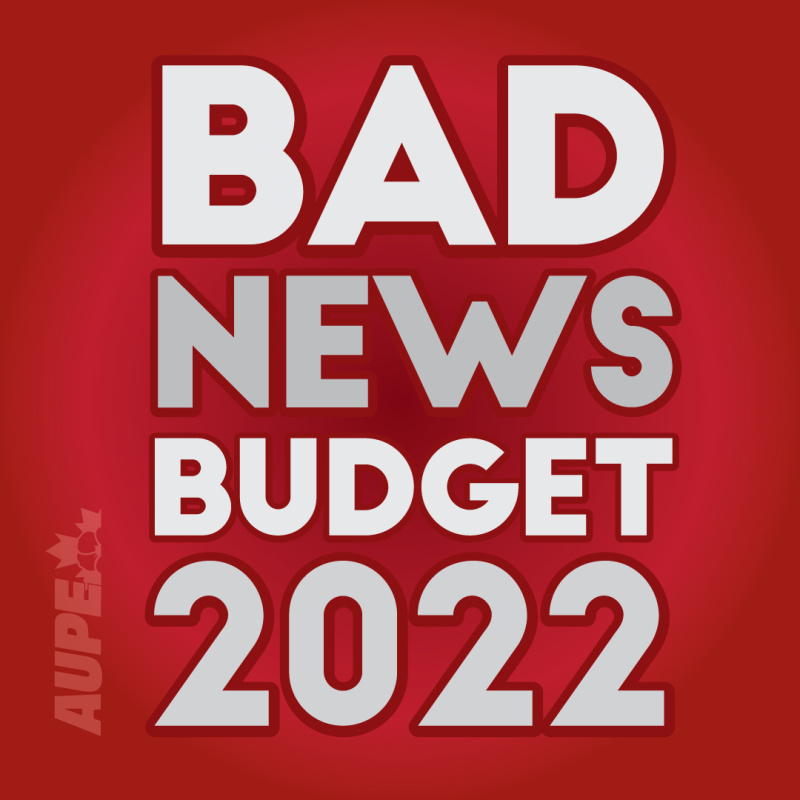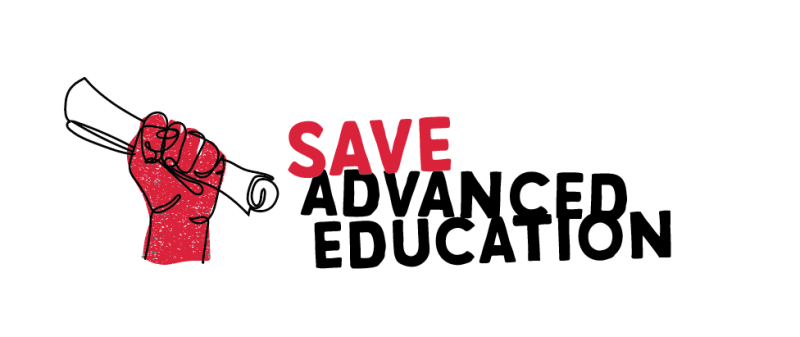Budget 2022: Prepare to fight against privatization
Despite high oil prices, this year’s budget lays groundwork for sell-offs
Mar 15, 2022
By Jon Milton, Communications Staff
In the few days before Alberta’s 2022 budget dropped, Finance Minister Travis Toews wrote an op-ed for the Edmonton Journal. He wrote that despite high oil prices, the UCP would “stick to the plan” of ensuring “responsible spending.” AUPE members have heard those words before, and we know what it means—it means budget cuts, austerity, and privatization.
It wasn’t much of a surprise. This government has always been about austerity. Hundreds of millions of dollars in cuts to post-secondaries, privatizing huge swaths of public healthcare, introducing private delivery of care, attacking union-jobs in the public sector—this has been the UCP’s bread and butter since before they even took power. But they’ve always justified it with the economic fallout from low oil prices—now, with oil prices soaring back up, that justification is gone. But they’re still cutting, like they’ve always wanted to.
“The UCP is the party of privatization and cuts,” says AUPE president Guy Smith. “The economic crisis has always just been a pretext. They’re cutting because they want to dismantle public services, even though the financial facts don’t support such a damaging agenda.”
When the budget was released, it confirmed what we already knew. This budget, no matter how much better the government’s finances are doing, it a privatization budget. Let’s take stock of some of the measures.
“The UCP is the party of privatization and cuts.”
Jobs and budget cuts
No sector was hit as hard this year as post-secondary education was last year—when the UCP cut hundreds of jobs from the sector. However, there are still significant cuts, like the expected loss of 102 jobs in the Ministry of Community and Social Services. An additional 22 jobs are on the chopping block in Advanced Education, 38 jobs at the different branches of Treasury Board and Finance, 14 jobs at Labour and Immigration, and another five at Culture and Status of Women. The government will also cut Correctional Services by $8 million, according to the budget.
“Government of Alberta workers were right to focus on job security in their last negotiations,” Smith says. “It’s clear that this government wants to slash and burn our jobs. Every job cut hurts, but at least we have some protection now.”
In health care, as part of what the UCP described as “a historic expansion of health-care capacity,” the province also intends to increase full-time equivalents at Alberta Health Services (AHS) by 850, or around one per cent of the total jobs. This budget also increases AHS’ budget by about $600 million. But to keep up with inflation and the needs of Alberta’s growing population, AHS would need to increase its budget by 4.6 per cent—nearly double the increase proposed.
“The UCP’s so-called ‘historic investment’ in health care is actually a cut,” Smith says. “If spending doesn’t keep up with increased population and costs, then we have less health-care capacity. We need to be reversing years—decades, even—of cuts, not digging ourselves deeper in the hole.”
Since the UCP took power, inflation and population growth demands a 14.03 per cent increase in the health-care budget by the end of this year, but total health spending over those years has only increased by 5.5 per cent.
Privatizing surgeries and continuing care

One of the UCP’s staple health-care policies has been the Alberta Surgical Initiative, which they say will reduce wait times for surgeries. The first problem is they plan to do this by funding private, for-profit surgical providers. In the leadup to this year’s budget, government representatives said they want the proportion of private surgeries to double, from 15 to 30 per cent. The second problem is that increasing the number of private providers will not in fact reduce wait times.
“We know that privatizing surgeries is a failed model,” Smith says. “We know that when Saskatchewan implemented a similar plan, it only reduced surgical wait times for a brief period—then, the backlog skyrocketed. Today, that backlog is larger than ever. Is this what the UCP wants?
“Albertans don’t want US-style health care in this country,” Smith adds. “We know that we rely on public health care to protect us. We know that the reason less people died of COVID in Canada is because of public care. And we won’t accept a health-care system that only serves the rich and drains resources from public care into the hands of profit-making corporations.”
It’s not just surgeries, either. The UCP is the latest in a long line of governments that support the unscrupulous growth of for-profit continuing care in Alberta. This government’s “expert panels” which created the infamous Ernst & Young report on Alberta Health Services have recommended privatizing Capital Care & CareWest. So far, the UCP has not acted on that recommendation, but we need to stay vigilant.
“If spending doesn’t keep up with increased population and costs, then we have less health-care capacity. We need to be reversing years—decades, even—of cuts, not digging ourselves deeper in the hole.”
In this year’s budget, we see funds to create over 1,500 new continuing care beds. “Many” of them will be subject to a Request for Expression of Interest and Qualification process, which points to the likelihood that they will be privately-owned, profit-driven beds.
“The past two years have shown us that private continuing care is less effective in preventing the deadly impacts of the pandemic,” Smith says. “Residents of private continuing care homes were much more likely to die of COVID than residents in public homes. Private care sacrifices quality of care to maximize profits for owners and shareholders.”
The budget also earmarks significant increases to funding for home care—an important industry, but one that is plagued with labour problems. Many home care workers are classified as freelancers, which prevents them from accessing the labour standards that protect us on the job.
“If we’re going to build a resilient home-care system in Alberta—which we absolutely should be doing—then we need to make sure that home care works for both seniors and workers,” Smith says.
Attacks on Education

K-12 education is also on the chopping block for the UCP. Education Minister Adriana LaGrange has made no secret of her disdain for public schools and preference for private and religious education. This budget works to implement “school choice,” a euphemism for increasing private and charter schools.
Charter schools, which received an additional $72 million in this year’s budget, follow the UCP playbook perfectly—they’re funded by the government, but their profits are privatized. Albertans pay the cost; they keep the cash.
“Having a functional public school system is a baseline for any healthy society,” Smith says. “When rich parents can send their children to elite schools, while poor children are crammed into a crumbling public system, our society is very sick. That’s the road that we’re heading down with K-12 privatization.”
Post-secondary education is taking it even harder. Over the past three years, the UCP has cut over $700 million from higher education in Alberta, and universities across the province are starving for resources to keep the lights on. University administrations are responding by turning the screws on both students and workers and turning themselves into “job skills factories” to attract private funding.
For students, we’re already seeing unprecedented tuition increases, such as the ones which would make the University of Alberta the most expensive university to attend in Canada, with some programs costing an additional $10,000 per year to attend.
For workers, universities continue to abolish positions and attempt to force rollbacks at the bargaining table. This has triggered a wave of labour unrest at universities in Alberta.
“The UCP has launched a full-frontal assault on post-secondary education in Alberta,” Smith says. “We need to be clear about what they are doing—their plan is defund public universities. It is our job to fight back and defend public education.”
Time to get organized
This budget has taken the mask off the UCP’s agenda. With surging oil prices, this government clearly has the budget to properly fund public services—the oil slump excuse no longer applies. But no matter how much revenue they take in, nothing will be enough to convince them that public services are worthy of support.
“If we’re going to defend public services, and our jobs, we’re going to have to continue to organize,” Smith says. “The government is dedicated to dismantling the services that Albertans rely on and replacing decent jobs with low-paid contracts. We can’t let them.
“Solidarity is our strongest power as working people. We have proven time and again that we can force governments to back down from a damaging agenda of austerity, cuts and privatization. This latest government budget is another clear example of why we need to rely upon our solidarity once again.”